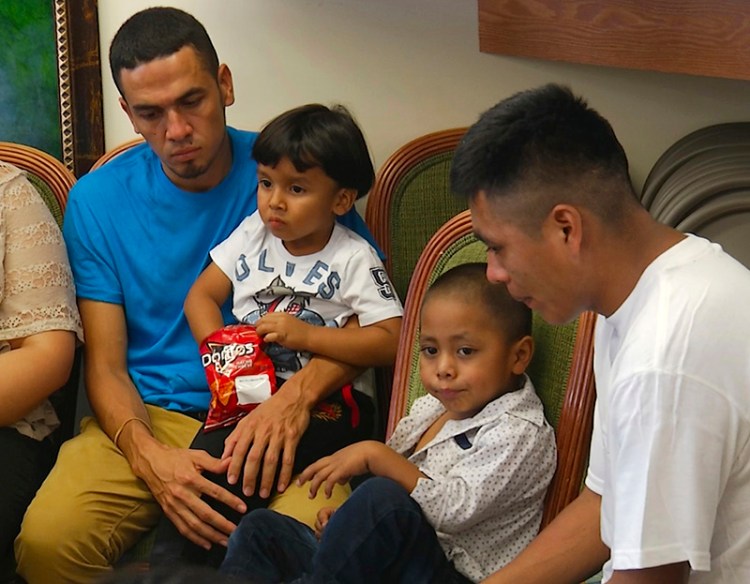The Trump administration said early Thursday that officials have reunited 57 of 103 young migrant children with their parents after separations of weeks or months, but would not return another 46 children for reasons that range from concerns about their safety to their parents having been deported.
U.S. District Judge Dana Sabraw in San Diego had given federal officials until Tuesday to reunite all children under age 5 who had been separated from their parents or other adults as part of the Trump administration’s crackdown on people crossing the U.S.-Mexico border.
The separations – which also involve somewhere under 3,000 older children – have sparked international outrage and considerable confusion. In court earlier this week, officials said it is possible that one young child held in federal custody for more than a year is a U.S. citizen. Sabraw has given the government until July 26 to reunite the older children with their parents as well.
In a joint statement Thursday morning, Health and Human Services Secretary Alex Azar, Homeland Security Secretary Kirstjen Nielsen and Attorney General Jeff Sessions said the government has “worked tirelessly” to reunite children taken from their parents by the government, while also assuring “the well-being of the children and returning them to a safe environment.”
“Our message has been clear all along: Do not risk your own life or the life of your child by attempting to enter the United States illegally,” the statement said. “Apply lawfully and wait your turn.”
The government said 22 young children were deemed ineligible for reunification “due to safety concerns posed by the adults in question.” Eleven of those adults had serious criminal histories, the statement said, including “charges or convictions” for child cruelty, kidnapping, murder, human smuggling or domestic violence. Seven of the adults “were determined not to be a parent” of the child with whom they entered the country, the government said. One adult had a falsified birth certificate, one was accused of abusing the child who had been brought across the border, one was being treated for “a communicable disease” and one had planned to house their child with an adult who had been charged with child sexual abuse.
Twelve adults were not reunited with their children because the adults had been deported and the U.S. government is in the process of contacting them, the statement said. Nine adults are in federal custody for other offenses, two are in state jails for other offenses and the location of one adult believed to be the parent of a separated child has been unknown for more than a year.
Sabraw ordered the reunifications in response to a class-action lawsuit filed by the American Civil Liberties Union on behalf of some 2,000 parents.
ACLU lawyers have protested that federal officials were taking too long to find the parents who were deported and dragging out the vetting process of parents still in the United States by requiring home checks or DNA testing for adults who were clearly the children’s parents. Such testing, they said, is usually reserved for circumstances in which there are questions about the relationship between the parent and child.
On Tuesday, Justice Department lawyers told Sabraw they would reunite 38 children by the deadline. But Sabraw told officials to move faster, saying he believed 63 children could be quickly returned to their families.
Most of the parents reunited with the youngest children this week were being released from custody on ankle monitoring devices to await immigration hearings.
But lawyers said in court that the government may try to detain parents and older children after they are reunited later this month, in an effort to continue Trump’s “zero-tolerance” policy of criminally charging and jailing all adults who cross the border illegally, including those who request asylum or are crossing with children, which is a departure from the past.
Officials have considered using military installations to hold detained parents and children, because the three existing family detention centers are mostly full.
A federal consent decree requires the government to release children from family detention facilities within 20 days.
Sessions announced the zero-tolerance policy in May, although some separations happened before then. Parents were charged with the misdemeanor crime of crossing the border illegally and jailed for court hearings, while their children were sent to shelters or foster care.
Critics said the administration failed to track the separated families, making it difficult to reunite them. Physicians and others blasted the policy and warned about lasting psychological damage to children and parents.
Trump stopped the separations before Sabraw’s June 26 order that all children be reunited with their parents. Customs and Border Patrol also stopped referring all parents from criminal prosecution, essentially returning the situation at the border to the previous status quo.
Sabraw, appointed in 2003 by President George W. Bush, had ordered officials to provide an update on their progress on Thursday and scheduled a hearing Friday afternoon to discuss the deadlines and other issues.
Send questions/comments to the editors.


